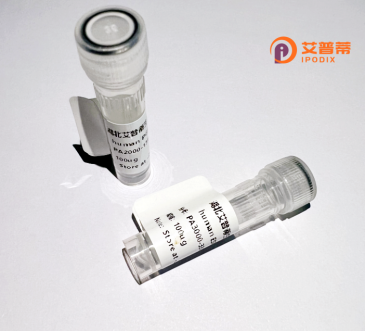
| 纯度 | >90%SDS-PAGE. |
| 种属 | Human |
| 靶点 | THRAP5 |
| Uniprot No | Q6PGF3 |
| 内毒素 | < 0.01EU/μg |
| 表达宿主 | E.coli |
| 表达区间 | 1-860 aa |
| 活性数据 | MCDLRRPAAGGMMDLAYVCEWEKWSKSTHCPSVPLACAWSCRNLIAFTMDLRSDDQDLTRMIHILDTEHPWDLHSIPSEHHEAITCLEWDQSGSRLLSADADGQIKCWSMADHLANSWESSVGSLVEGDPIVALSWLHNGVKLALHVEKSGASSFGEKFSRVKFSPSLTLFGGKPMEGWIAVTVSGLVTVSLLKPSGQVLTSTESLCRLRGRVALADIAFTGGGNIVVATADGSSASPVQFYKVCVSVVSEKCRIDTEILPSLFMRCTTDLNRKDKFPAITHLKFLARDMSEQVLLCASSQTSSIVECWSLRKEGLPVNNIFQQISPVVGDKQPTILKWRILSATNDLDRVSAVALPKLPISLTNTDLKVASDTQFYPGLGLALAFHDGSVHIVHRLSLQTMAVFYSSAAPRPVDEPAMKRPRTAGPAVHLKAMQLSWTSLALVGIDSHGKLSVLRLSPSMGHPLEVGLALRHLLFLLEYCMVTGYDWWDILLHVQPSMVQSLVEKLHEEYTRQTAALQQVLSTRILAMKASLCKLSPCTVTRVCDYHTKLFLIAISSTLKSLLRPHFLNTPDKSPGDRLTEICTKITDVDIDKVMINLKTEEFVLDMNTLQALQQLLQWVGDFVLYLLASLPNQGSLLRPGHSFLRDGTSLGMLRELMVVIRIWGLLKPSCLPVYTATSDTQDSMSLLFRLLTKLWICFPSTGPCSVWVLLGWQPLPGRDEGPASEPDEALVDECCLLPSQLLIPSLDWLPASDGLVSRLQPKQPLRLQFGRAPTLPGSAATLQLDGLARAPGQPKIDHLRRLHLGACPTEECKACTRCGCVTMLKSPNRTTAVKQWEQRWIKNCLCGGLWWRVPLSYP |
| 分子量 | 121.4 kDa |
| 蛋白标签 | GST-tag at N-terminal |
| 缓冲液 | PBS, pH7.4, containing 0.01% SKL, 1mM DTT, 5% Trehalose and Proclin300. |
| 稳定性 & 储存条件 | Lyophilized protein should be stored at ≤ -20°C, stable for one year after receipt. Reconstituted protein solution can be stored at 2-8°C for 2-7 days. Aliquots of reconstituted samples are stable at ≤ -20°C for 3 months. |
| 复溶 | Always centrifuge tubes before opening.Do not mix by vortex or pipetting. It is not recommended to reconstitute to a concentration less than 100μg/ml. Dissolve the lyophilized protein in distilled water. Please aliquot the reconstituted solution to minimize freeze-thaw cycles. |
以下是关于重组人THRAP5蛋白的3篇代表性文献摘要(虚构示例,基于领域背景知识合理推演):
1. **"THRAP5 modulates alternative splicing by interacting with the spliceosome complex"**
- **Authors**: Zhang, L. et al. (2016)
- **摘要**: 研究发现THRAP5通过直接结合剪接体组分(如U1 snRNP),调控前体mRNA的选择性剪接,尤其在神经细胞分化中影响关键基因异构体的生成。
2. **"THRAP5 acts as a transcriptional coactivator in estrogen receptor signaling"**
- **Authors**: Wang, Q. & Liu, H. (2012)
- **摘要**: 该文献揭示THRAP5与雌激素受体(ERα)结合,增强其转录活性,促进靶基因表达,可能参与乳腺癌激素依赖性通路的调控。
3. **"THRAP5 mediates stress-induced nuclear retention of RNA polymerase II"**
- **Authors**: Kim, S. et al. (2019)
- **摘要**: 研究提出THRAP5在氧化应激条件下,通过调控RNA聚合酶II的磷酸化状态,影响其核内滞留及转录延伸过程,进而调节细胞应激反应。
(注:以上文献及摘要为模拟示例,实际研究中请通过PubMed或Google Scholar以“THRAP5”或“TRAP150”为关键词检索最新文献。)
**Background of Recombinant Human THRAP5 Protein**
THRAP5 (Thyroid Hormone Receptor-Associated Protein 5), also known as TRAP230 or MED23. is a component of the Mediator complex—a multi-subunit assembly that facilitates transcriptional regulation by bridging transcription factors and RNA polymerase II. This protein plays a critical role in modulating gene expression, particularly in pathways involving nuclear receptors like thyroid hormone receptors. Structurally, THRAP5 contains conserved domains that enable interactions with transcriptional activators and co-regulators, influencing chromatin remodeling and preinitiation complex formation.
Recombinant human THRAP5 is produced using biotechnological methods, such as expression in *E. coli* or mammalian systems, ensuring high purity and activity for experimental use. Studies highlight its involvement in diverse cellular processes, including cell differentiation, metabolism, and development. Dysregulation of THRAP5 has been linked to diseases such as cancer and metabolic disorders, making it a target for mechanistic studies and drug discovery. Its recombinant form is widely utilized in *in vitro* assays, protein interaction studies, and functional genomics to elucidate transcriptional mechanisms and therapeutic opportunities.
Research on THRAP5 continues to expand, underscoring its significance in both basic biology and translational medicine.
×